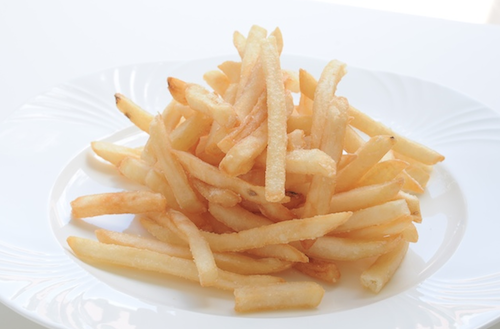Fat and Prostate Cancer
 In the U.S., prostate cancer kills nearly as many men as breast cancer kills women. In non-smoking men it is the number one cancer killer. Back in the 1960s, when adult men migrated from a low-risk country, like Japan, to the U.S., their risk of prostate cancer increased 3-fold and approached that of those who consumed a Westernized diet from early childhood.1 Another study found that the amount of animal fat consumed early in life had little impact on the risk of developing prostate cancer. However, more animal fat later in life was associated with an increased risk of developing prostate cancer later in life.2
In the U.S., prostate cancer kills nearly as many men as breast cancer kills women. In non-smoking men it is the number one cancer killer. Back in the 1960s, when adult men migrated from a low-risk country, like Japan, to the U.S., their risk of prostate cancer increased 3-fold and approached that of those who consumed a Westernized diet from early childhood.1 Another study found that the amount of animal fat consumed early in life had little impact on the risk of developing prostate cancer. However, more animal fat later in life was associated with an increased risk of developing prostate cancer later in life.2Not only population studies but also case-control and cohort studies all support a fairly strong connection between some aspect of foods high in animal fats and the development of prostate cancer. The intake of vegetable fat appears to have little impact on the risk of developing prostate cancer.3 However, total dietary fat intake could increase the risk of prostate cancer by promoting excessive calorie intake and weight gain. Overweight men had a 2.5 fold increased risk of developing prostate cancer compared to men who were not overweight.4 This same study of Seventh Day Adventists found a 3.6 fold increase in the risk of developing prostate cancer in the men who consumed the most meat, milk, eggs and cheese compared to most vegetarian men. A large prospective study of about 50,000 men age 40-75 years also found about a 3 1/2-fold increased risk in men who consumed the most fat. This study found the strongest association with fat from red meat and prostate cancer.5 A study of men who followed a very-low-fat, near vegetarian diet and exercised daily for 3 weeks found a dramatic 50% drop in serum estradiol levels and dramatically lower blood lipid levels.6 Higher estradiol levels have been associated with an increased risk of both heart disease and prostate cancer.The bottom line: A diet high in meat, fatty dairy products, eggs and other sources of animal fats, increases the risk of prostate cancer and cardiovascular disease. A low-fat, high-fiber, more vegetarian diet and increased exercise should dramatically reduce mortality from both cardiovascular disease and prostate cancer.Resources:1. J Nat Cancer Inst 1968;40:43-682. Am J Clin Nutr 1990;52:752-73. Am J Clin Nutr 1997;66(supplement):1557S-63S4. Am J Epid 1984;120:244-505. J Natl Cancer Inst 1993;85:1571-96. Am J Med 1985;78:23-7
